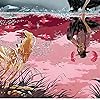Cindy McBride
asked:
Ummm, so does this book imply approval or disapproval of divergent gender identities and the validity (or lack thereof) of religion? Answers will determine whether or not I'll be interested in reading. Thanks!
To answer questions about
Too Like the Lightning,
please sign up.
Ada Palmer
Great question! Separate answers on gender & religion, but parallel in some ways: in these books I'm attempting to depict a future that has developed very well on some fronts, but badly on others, with some great successes (150 year lifespan! World peace!) and some great failures (Another world war, censorship...) Two of its greatest failures/tensions are on the fronts of gender & religion.
On the religious front, fear of organized religion, caused by religious violence, has led to severe censorship of religious discourse & the outlawing of any organized religion outside of "reservations" <= an intentionally very alarming term. All people are expected to have religious opinions, and have religious discourse with licensed "sensayers" in a one-on-one therapy setting, but to even discuss it in a group is both taboo and illegal. The book then looks at the effects this has on people, and looks especially at the problems created by stifling discourse, especially when something which appears to be a genuine miracle occurs but no one is allowed to talk about it, let alone deal with its global consequences.
I certainly intend the book to be respectful of and positive about religion, and to be commenting on a tension which has been growing in our society of late, between people who feel it's important to be public/out about religion, and people who feel uncomfortable when asked about their religion, as if it were a violation of privacy. I've had a mixture of reactions to the book, from some readers who say it feels like a paradise having religion be silenced and private like that, to others who say it feels like an oppressive dystopia with no place for them if they can't have religious gatherings or wear a religious symbol in public. That split is precisely what I was aiming for, since much of my goal is to look at a tension within our own society that isn't discussed much, and to demonstrate how people who want religion to be public and people who want it to be private can be in tension with each other even if they both happen to be believers, or even share the same faith.
As for gender, this is only begun in book 1 and really fleshed out in book 2, but this is intended to be a future that botched its gender development, where a our current efforts to secure more openness toward gender variation, our transgender rights efforts, our feminist efforts, a vast array of social efforts related to gender, all failed without people realizing that they failed. The narrator argues that the society he lives in is not a gender neutral society, but just pretends to be gender neutral; the only acceptable pronouns are they/them/theirs, and gendered expression is taboo, something which most people think is a great step toward equality without thinking about what it stifles. While people in this world believe that gender is a thing of the past, the narrator believes that gender is still a powerful force in how people think, creating tensions, inequalities, vulnerabilities, and suppressing self-expression. Because the society has declared that gender is gone, all dialog about the issue ended, so all efforts toward improving on it are now impossible. The conversation ended too soon, and now people who want to express gender can only do so in secret or transgressive ways. Over the course of the book, the reader is supposed to think about the narrator's opinions about gender in this society, and decide whether we believe his analysis.
The narrator applies gendered pronouns to the characters, but we know that the narrator is doing this himself, without the consent of those he is gendering, and we also know that he's doing it, not based on bodies/assigned gender, but based on his opinions of people's personalities and how they fit his own sense of gender. Sometimes he oscillates or professes uncertainty about which to use. Gender identities other than "male" and "female" come into play more in book 2, and we see some of our narrator's ineptitudes in dealing with them. This narrator seems to be comfortable with "he" and "she" being related to personality rather than anatomy, but struggles when people are in-between, demonstrating how he too is trapped in this future's failure to complete gender liberation.
The whole reading experience -- experiencing this gender-silenced world and the narrator's inept obsession with gender -- are supposed to show the possible negative consequences of us giving up the conversation too soon. From time to time you hear people say things like "Feminism is finished" or "Women have the vote, feminism is done, it's time to move on," which is, of course, deeply false, and indeed dangerous, since we have so much further to go. This book posits a future where society DID move on too soon, both from the feminism conversation and from the gender/transgender/intersex/divergent gender conversation, achieving the surface victory of gender neutral pronouns and declaring it to be a kind of liberation whereas it is actually a vast act of censorship masking the fact that the much deeper, larger liberation which we're fighting for now has, in this future, been thrown away. Looking at a world that failed on gender is uncomfortable, intentionally so, but I hope it will help people come away with the conviction that we must do better than this, offering a new way to prove how important it is to keep fighting.
Hope these answers help?
On the religious front, fear of organized religion, caused by religious violence, has led to severe censorship of religious discourse & the outlawing of any organized religion outside of "reservations" <= an intentionally very alarming term. All people are expected to have religious opinions, and have religious discourse with licensed "sensayers" in a one-on-one therapy setting, but to even discuss it in a group is both taboo and illegal. The book then looks at the effects this has on people, and looks especially at the problems created by stifling discourse, especially when something which appears to be a genuine miracle occurs but no one is allowed to talk about it, let alone deal with its global consequences.
I certainly intend the book to be respectful of and positive about religion, and to be commenting on a tension which has been growing in our society of late, between people who feel it's important to be public/out about religion, and people who feel uncomfortable when asked about their religion, as if it were a violation of privacy. I've had a mixture of reactions to the book, from some readers who say it feels like a paradise having religion be silenced and private like that, to others who say it feels like an oppressive dystopia with no place for them if they can't have religious gatherings or wear a religious symbol in public. That split is precisely what I was aiming for, since much of my goal is to look at a tension within our own society that isn't discussed much, and to demonstrate how people who want religion to be public and people who want it to be private can be in tension with each other even if they both happen to be believers, or even share the same faith.
As for gender, this is only begun in book 1 and really fleshed out in book 2, but this is intended to be a future that botched its gender development, where a our current efforts to secure more openness toward gender variation, our transgender rights efforts, our feminist efforts, a vast array of social efforts related to gender, all failed without people realizing that they failed. The narrator argues that the society he lives in is not a gender neutral society, but just pretends to be gender neutral; the only acceptable pronouns are they/them/theirs, and gendered expression is taboo, something which most people think is a great step toward equality without thinking about what it stifles. While people in this world believe that gender is a thing of the past, the narrator believes that gender is still a powerful force in how people think, creating tensions, inequalities, vulnerabilities, and suppressing self-expression. Because the society has declared that gender is gone, all dialog about the issue ended, so all efforts toward improving on it are now impossible. The conversation ended too soon, and now people who want to express gender can only do so in secret or transgressive ways. Over the course of the book, the reader is supposed to think about the narrator's opinions about gender in this society, and decide whether we believe his analysis.
The narrator applies gendered pronouns to the characters, but we know that the narrator is doing this himself, without the consent of those he is gendering, and we also know that he's doing it, not based on bodies/assigned gender, but based on his opinions of people's personalities and how they fit his own sense of gender. Sometimes he oscillates or professes uncertainty about which to use. Gender identities other than "male" and "female" come into play more in book 2, and we see some of our narrator's ineptitudes in dealing with them. This narrator seems to be comfortable with "he" and "she" being related to personality rather than anatomy, but struggles when people are in-between, demonstrating how he too is trapped in this future's failure to complete gender liberation.
The whole reading experience -- experiencing this gender-silenced world and the narrator's inept obsession with gender -- are supposed to show the possible negative consequences of us giving up the conversation too soon. From time to time you hear people say things like "Feminism is finished" or "Women have the vote, feminism is done, it's time to move on," which is, of course, deeply false, and indeed dangerous, since we have so much further to go. This book posits a future where society DID move on too soon, both from the feminism conversation and from the gender/transgender/intersex/divergent gender conversation, achieving the surface victory of gender neutral pronouns and declaring it to be a kind of liberation whereas it is actually a vast act of censorship masking the fact that the much deeper, larger liberation which we're fighting for now has, in this future, been thrown away. Looking at a world that failed on gender is uncomfortable, intentionally so, but I hope it will help people come away with the conviction that we must do better than this, offering a new way to prove how important it is to keep fighting.
Hope these answers help?
Jonathan Sneed
A few of the characters are polemical on issues of religion or gender, including the narrator. But it's a very alien sort of polemic, because it's a very alien world.
Gender and religion are 'swept under the rug' by social (and sometimes legal) taboo, and the catastrophic consequences of this blind spot are a major part of the book's plot. If there's a moral here, it's that we can't be satisfied with the easy answers and bumper stickers; metaphysical inquiry and gender identity are powerful, complex parts of being human, and they demand nuance, humility, and continuing engagement. When the characters of TLtL forget this, it tends to bite them in the ~.
Gender and religion are 'swept under the rug' by social (and sometimes legal) taboo, and the catastrophic consequences of this blind spot are a major part of the book's plot. If there's a moral here, it's that we can't be satisfied with the easy answers and bumper stickers; metaphysical inquiry and gender identity are powerful, complex parts of being human, and they demand nuance, humility, and continuing engagement. When the characters of TLtL forget this, it tends to bite them in the ~.
Kim
The society is officially gender-neutral (although some parts less than others) but the book repeatedly makes the claim that centuries of gender-based stereotyping has been hard to wash away. The society has no gendered pronouns, for instance.
The narrator, who is flouting the gender-neutral status quo by doing such things as using gendered pronouns, defines gender (generally) by stereotypical behaviours and not sex organs, so a 'She' might have any biology/chemistry/etc. but may be more likely to belong to a certain society. Another character presents as agender in a way that far outstrips the common way of understanding that in society, and uses that ambiguity powerfully to their advantage. There are also groups who deliberately flout the gender-neutral norm, but are not looked down upon for it.
The majority of characters make no claims as to religious truth and those that do are extremely controversial. The general attitude isn't "this is or is not valid," but "do try to ask questions."
The narrator, who is flouting the gender-neutral status quo by doing such things as using gendered pronouns, defines gender (generally) by stereotypical behaviours and not sex organs, so a 'She' might have any biology/chemistry/etc. but may be more likely to belong to a certain society. Another character presents as agender in a way that far outstrips the common way of understanding that in society, and uses that ambiguity powerfully to their advantage. There are also groups who deliberately flout the gender-neutral norm, but are not looked down upon for it.
The majority of characters make no claims as to religious truth and those that do are extremely controversial. The general attitude isn't "this is or is not valid," but "do try to ask questions."
Scott
If you are interested in hearing about "divergent gender identities", then I say go for it. This is certainly an interesting lesson in gender politics and an exercise in thinking differently about gender. If you are looking for a book that will cast disapproval on them, stick to your weird right-wing fantasy books. As far as implying the validity of religion? Same answer: go for it if you want to explore new ideas, stay away if you want your pre-existing attitudes to be reinforced.
Joy
After reading the book--I'm still not sure. Gender appears to be very socially constructed in this world (in a way I personally would see as sexist, but that's the world and not, I think, authorial approval or disapproval), and yet the narrator sees both aspects. The book doesn't seem so much caught up in whether religion is valid, but explores the impact of the miraculous on a society that sees religion as being intensely and exclusively personal and socially taboo (after what appears to be nearly apocalyptic religious wars). I might say that the book isn't really looking to validate anything so much as question and explore.
Jeremy Maddux
Ah, so you're only interested in reading books that reassure you that you're right?
Mark Parnell
The easiest way I can think of answering this question without getting into spoiler territory is to change the title of the book from Too Like the Lightning to Human Nature is too like the Lightning, unpredictable and destructive, beautiful and illuminating. While I can't speak for Ada Palmer, my interpretation was that there is great hypocrisy in how humans define themselves. What we are learning through the eyes of our narrator is that despite the supposed Utopia 25th century humanity lives in, not everything is as it appears.
Seth Herd
It addresses both issues in some depth, and it presents both sides quite well. If you want a book to confirm your existing views, on either side, you'll want to choose a simpler work.
Kaz
I would absolutely urge anyone interested in those questions to read this book and make up their own mind. Does the book imply approval or disapproval? Does the author? Do the characters? Does it intend to sway you, the reader? Those are all different questions, and it is well worth reading in order to think them through for yourself.
Harrier
I personally did not finish at first, because of a line that came across as transphobic early on' "Show me whether this she-man wears a strap-on". However, having read the author's comments below, I 'm going to pick it back up and keep going. It can be hard to write a commentary on gender relations and identity by showing the negative without coming across as believing the negative. I also hated the obsession with gender but I now get it's the narrator's not the authors, and that it becomes important throughout the story. That it is intended to come across as so.
So I'm going back because otherwise, I really loved the story and now I know not to be put off by the phrasing believing it to be the author's thoughts, but that the phrasing is intended to put you off to that character, not the author.
So I'm going back because otherwise, I really loved the story and now I know not to be put off by the phrasing believing it to be the author's thoughts, but that the phrasing is intended to put you off to that character, not the author.
Adger Williams
The narrator projects very distinct views, but he's not at all reliable. Since the book does not so much end, as stop waiting for book 2, it's hard to be sure what the author intends. Suggest you read it, skipping the excess gore and sex if you are so minded. (They are philosophically motivated within the plot, but they are still excess gore and sex.)
Sylvia McIvers
The narrator deliberately uses gender-stereotypes do define gender, rather than biology. And occasionally says, ooh, I described this person's character as female, i bet you're surprised that she has a beard...
Then the narrator pretends to hear the listener say, stop pulling childish tricks like that, just tell the story...
Then the narrator pretends to hear the listener say, stop pulling childish tricks like that, just tell the story...
Dylan
It's really complicated to answer this question. The narrator has some stereotyped views on gender (including assigning gender to other people without particular regard to self-identity), but the narrator's viewpoint is not that of the book overall.
Roberto
It's impossible to answer the religion part of your question without spoiling part of the book.
About Goodreads Q&A
Ask and answer questions about books!
You can pose questions to the Goodreads community with Reader Q&A, or ask your favorite author a question with Ask the Author.
See Featured Authors Answering Questions
Learn more













